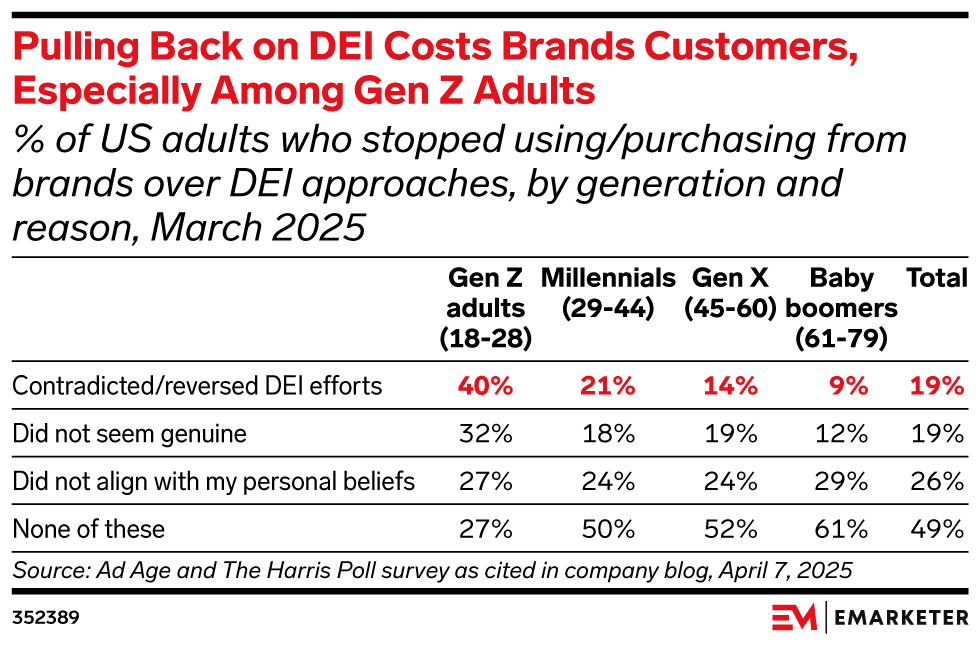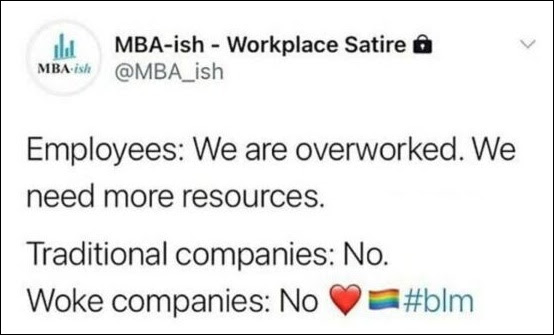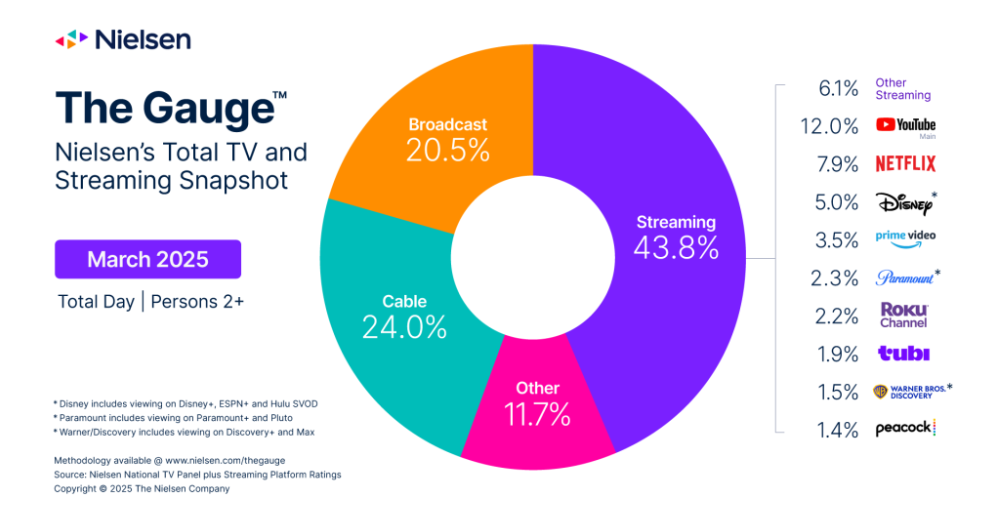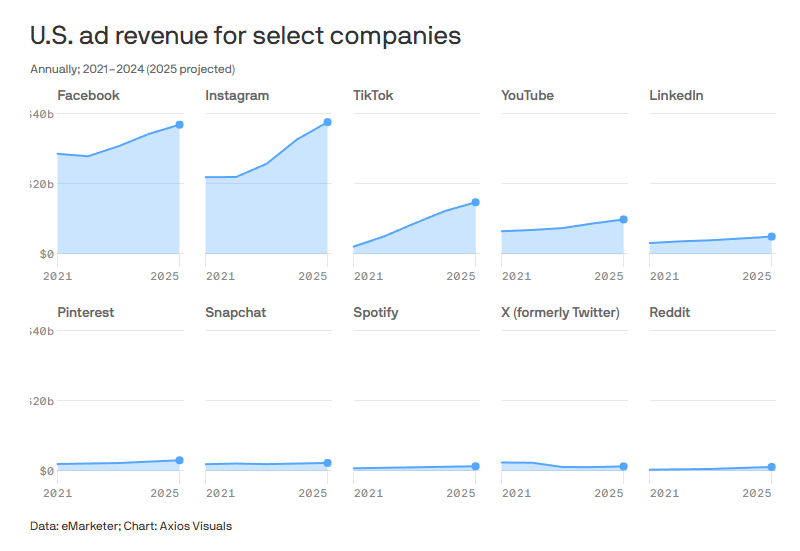Good Monday Morning!
It’s May 19th. Housekeeping: we’re off next week for Memorial Day and back in your email on June 1 at 6 a.m.
Today’s Spotlight is 895 words, just over 3 minutes to read.
3 Headlines to Know
Verizon Drops DEI to Secure $20B Fiber Deal
Verizon Won FCC approval for its $20 billion merger with Frontier only after agreeing to drop DEI initiatives and teams from its organization.
Google Bets Big on Next-Gen Nuclear Power
Google backs three new nuclear sites to fuel its AI data centers with low-carbon power.
Netflix Will Use AI to Disguise Ads as Content
Netflix will let advertisers blend their spots into shows and movies to make commercials on non-premium tiers look less like ads.
Younger Consumers Don’t Want DEI Cuts
By the Numbers

George’s Data Take
Promoting diversity, equity, and inclusion was once the safe move, but can now put companies in the crossfire between federal demands and customer desires.
Notice the gap: 29 percent of boomers say canceling DEI conflicts with their values, but only 9 percent mention DEI directly. For many, “DEI” signals deeper political divides in a fiercely tribal time.
VPN Firm Kills “Lifetime” Subscriptions Without Warning
VPNSecure’s new owners say they did not know about the lifetime accounts before buying the company and shut them down, leaving longtime customers cut off.
Silver Beacon Behind The Scenes
The new owners first claimed they did not know about the lifetime accounts, then argued they only bought the assets, not the company. Either way, this was a spectacularly bad move.
At best, a screwup like this means costly and time-consuming complaints. At worst, it could bring lawsuits or trigger regulatory action.
AI is Remaking Search

Image by ChatGPT, prompted by George Bounacos
Big Change
Artificial intelligence is being chased by every major search player.
The promise: synthesizing and summarizing information from across the web, not just linking to it. Google and OpenAI’s ChatGPT are both rolling out major upgrades that push the web closer to answer engines instead of just lists of links.
Google Gets Chatty
AI Mode is not just another AI Overview. For months, Google has shown AI answers at the top of search results, but now AI Mode brings a persistent, interactive answer bar to mobile.
Instead of only showing summaries after you search, you get a chat-style box that you can open, ask follow-ups, and see responses as you type even before you hit enter. This makes mobile search feel more like messaging and less like old-school searching. The feature is rolling out through Labs to some Android and iOS users, and it is noticeably more conversational than the previous AI tools.
ChatGPT Builds on Bing
OpenAI’s ChatGPT has taken a big step by expanding local and product search. It starts with data from Bing but layers on its own AI analysis, so it is not a copy-paste job.
Microsoft’s thirteen billion dollar investment in OpenAI makes this deep connection possible. If you run a business, you cannot afford to ignore your Bing business profile, because ChatGPT uses it as a foundation for local results.
Local Search is Huge
Stat to know: Nearly half of all Google searches are for local information. That means the AI tools that surface business info,
reviews, and directions are now the front door for customers.
Product Search Goes Personal
ChatGPT’s new shopping features deliver product recommendations, images, reviews, and links with no ads (yet) cluttering the results. Rankings are based on relevance and user needs, not pay-to-play.
The Takeaway
AI search is less about keywords and more about quality answers and trust. Businesses must keep their info up to date everywhere, especially on Bing and Google, to show up in these new AI-driven results.
Students Add Typos to AI Essays to Fool Detectors
Practical AI
College students are dodging AI plagiarism checks by making chatbot papers look more human using deliberate mistakes and clumsy prompts.
OpenAI Lets Users Export Research as Polished PDFS
Protip
ChatGPT users can now save and share reports in PDF format, making it easier for businesses to distribute and verify AI research. This is especially helpful for the company’s new multipage output when deep research mode is used.
Trump Posts Video Accusing Clintons of Murder
Debunking Junk
President Trump published a debunked video online Saturday that falsely claims his predecessor and his former chief rival are tied to multiple deaths of their employees or potential rivals.
Michael J Fox and Proud Canadian Create Proud Canadian Spot
Screening Room
Facemask Sensors Detect Kidney Disease on Your Breath
Science Fiction World
Researchers built disposable masks with embedded sensors that can identify chronic kidney disease with 93% accuracy by analyzing what you exhale.
Custom Gene Editing Saves Infant With Rare Disease
Tech For Good
with 93% accuracy by analyzing what you exhale CRISPR therapy tailored for one baby’s mutation, opening new hope for person-specific treatment of rare genetic disorders.
AI Tool Guesses Your Face’s Real Age
Coffee Break
FaceAge uses millions of images and skin markers to estimate how old you look and gives you advice for healthier skin. Yes, you have to give them or take a picture.
Sign of the Times






